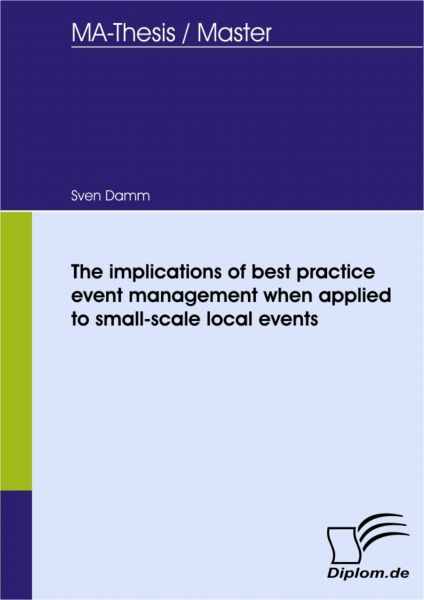The implications of best practice event management when applied to small-scale local events
Inhaltsangabe:Abstract:
Event management is a ubiquitous word in modern society. The word is used for small business breakfasts, large corporate shows and also for big international sport events, such as the Olympic Games. We all have an idea of what management is, but what is an event?
An event is often described as something that ‘happens’, and therefore, in that sense, we could use the term event management to describe the organisation of everything that happens. Getz defines an event as ‘an occurrence at a given place; a special set of circumstances; a noteworthy occurrence’, and this definition embraces a wide range of possibilities with one important thing in common: they can only occur once. As such, one key characteristic of events is that they are not continuous, for they each have a beginning and an end, and every event is different from the last one. ‘No matter how hard one tries, it is literally impossible to replicate an event”; thus, when watching the Olympic Games, we do not see the same picture repeating itself every four years, for the event changes and evolves over time. Consequently, to fully understand how things happen within any given event, it is necessary to get involved in the planning and execution of an event.
Malhotra writes that events are an important aspect of human life and that our understanding of them is poorly developed. He thinks that there is a ‘need to enhance the understanding of the subject”, and this opinion is supported by the relative youth of academic study into the topic. In their book, ‘Festival & Special Event Management’, Allen, O’Toole, Harris and McDonnell (2008) date the birth of the industry to the 1980s, where ‘several seminal events set the pattern for the contemporary event industry as we know it today”. Thus, especially compared with other disciplines in the field of social science, event management is a young discipline, and there is not yet a huge base of research to work with. In addition, rather than academically rigorous research conducted by professional researchers, much of the knowledge in the field has been generated by practising event managers who have written books about their own experiences, knowledge, and skills.
It is of no surprise that these practitioners, and the events they discuss, tend to reflect the planning of the biggest events the earth has seen, such as the Olympic Games and US presidential inaugurations. These authors possess a great deal of experience, and […]
Inhaltsangabe:Abstract:
Event management is a ubiquitous word in modern society. The word is used for small business breakfasts, large corporate shows and also for big international sport events, such as the Olympic Games. We all have an idea of what management is, but what is an event?
An event is often described as something that ‘happens’, ...
Versandkostenfreie Lieferung! (eBook-Download)
Als Sofort-Download verfügbar
- Artikel-Nr.: SW9783836646925

